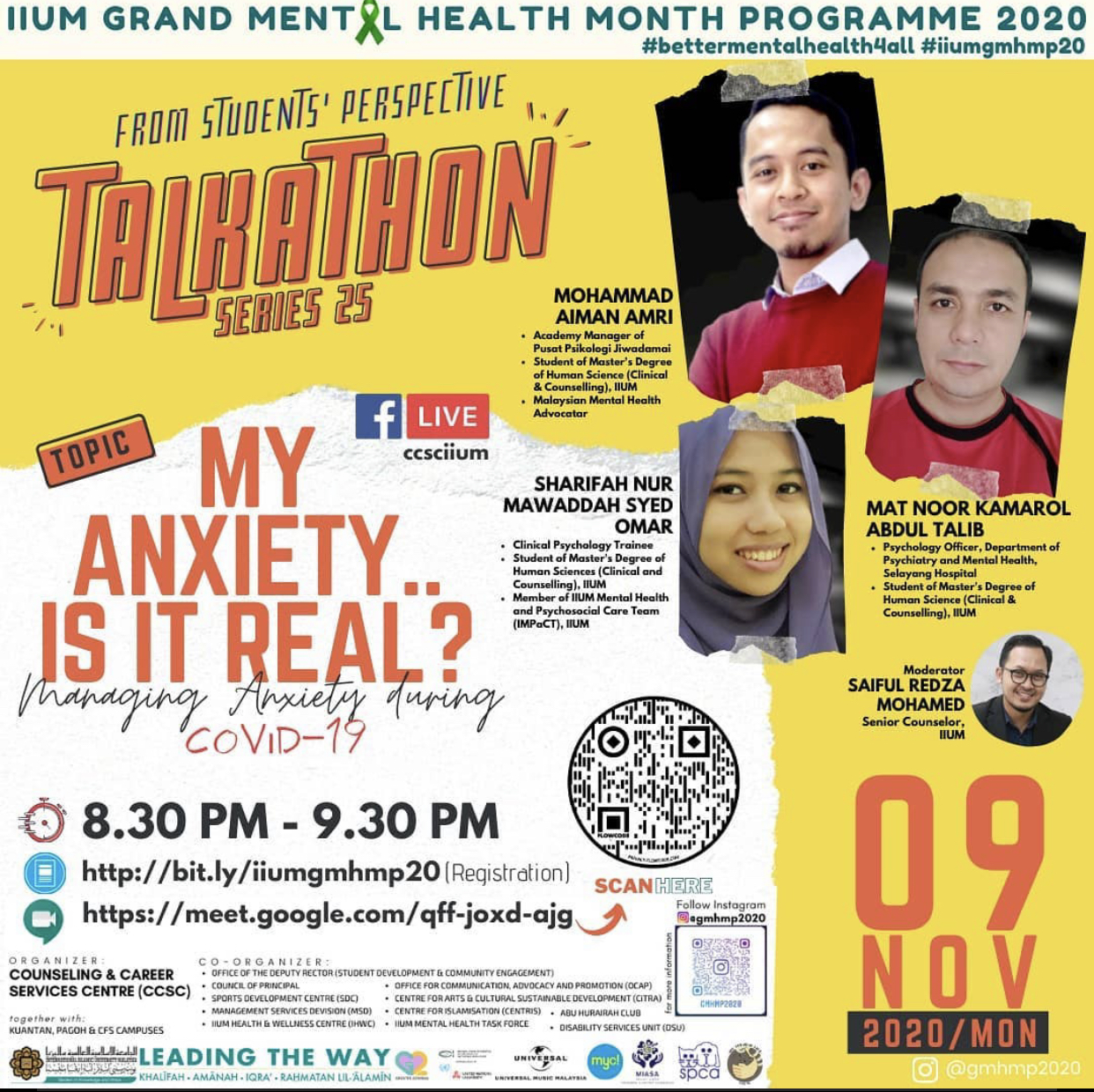By Sarah Yusoff
GOMBAK, 12 November 2020 – Anxiety, a word that most of us would come across these days as it is a common word that is being used by many to describe either their feelings or mental well being.
People often get anxiety due to situations or surroundings and the aftermath of it is not that beautiful of a sight.
With the presence of COVID-19, it has caused a huge impact on everyone’s life in various ways, mainly financial aspect, which then put people under massive pressure and worrisome feeling.
Hence, it is crucial for us to sort these feelings out, acknowledge them, and find a good coping mechanism to cope with it.
A webinar was conducted on Monday (9 November) where the topic of discussion was ˜My anxiety.. is it real?; Managing Anxiety During Covid-19.
The webinar was held in conjunction with the ‘Global Mental Health Month Programme 2020’ and was attended by more than 100 participants.
There were three panelists from different backgrounds who were invited to discuss and elaborate on various aspects of anxiety.
The moderator was Mr. Saiful Redza Mohamed, a senior counsellor from IIUM, and he started off by briefly introducing the panelists and went on to spark the discussion by asking a question regarding the difference between mental health and mental illness.
Dr. Sharifah Nur Mawaddah Syed Omar, a member of IIUM Mental Health and Psychosocial Care Team (IMPaCT), said that everyone has mental health because without mental health there is no health in general.
She went on to explain more about mental health by stating that it is related to our emotions, whereas mental illness is an illness that affects the way a person eats, behaves and functions.
œAnxiety is part of our emotions. In fact, if is one of the basic components of all emotions,” said Dr. Sharifah. She further explained on anxiety and said that an example of anxiety on a daily basis is stress and it could also occur occasionally for some, while others experience it on a daily basis.
Dr. Sharifah was responding to the question raised by the moderator, œIs anxious a normal feeling? Wheres the fine line between worries, anxious and anxiety?
Meanwhile, in response to the question, Dr. Mohammad Aiman Amri, the academy manager of Pusat Psikologi Jiwadamai, stated that anxiety is part of the human emotions, which makes it normal to have those sorts of feelings.
He added that there are both good and bad sides of anxiety, whereby the dark side of it has the ability to cause harm to us physically, and that could happen when the degree of anxiety increases, which results in physical pains such as chest ache and sharp head pain.
œWhen the feeling of it becomes unbearable and it affects our daily function such as sleeping and eating cycle, then it could be a sign of a mental disorder. You need to seek professional help to be clinically diagnosed, said Dr. Aiman.
The moderator said that it is important to be clinically diagnosed so that we are able to understand and know what kind of mental illness we are suffering from. He continued the discussion by asking a question, œHow can we know if we need to seek for professional help?
Dr. Mat Noor Kamarol Abdul Talib, a psychology officer from the Department of Psychiatry and Mental Health, Selayang Hospital, responded to the question by saying that anxiety is a survival factor, and when you are unable to survive, then theres something that has affected you emotionally, mentally and physically.
He also said that by refusing to seek for help, it will only make matters worse and could result into a severe depression.
œWe can seek for help before things get out of hand simply by checking on yourself. If you notice some changes within you that is taking place, then it is better to reach out for help as soon as possible, Dr. Sharifah added.
Mr. Saiful continued the discussion by asking regarding the number of Malaysians suffering from anxiety.
œThe numbers are rapidly increasing, and among those include teenagers who constantly overthink about their academic and future. Teenagers will show their emotions through behaviours by changing their diet and many other things. said Dr. Mat Noor.
Mr. Saiful then asked more about the general symptoms and the types of anxiety. In response, Dr. Sharifah described some of the most common symptoms, that comprise of the way a person thinks, acts, behaves, feels and also body sensation which includes heart pounding, trembling, dizzy, nauseous, hot flushes and shortness of breath.
Speaking of the types of anxieties, Dr. Sharifah stated there are several of them, those are panic disorders, agoraphobia and generalised anxiety disorder.
Dr. Sharifah also talked about IIUM Mental Health and Psychosocial Team (IMPaCT), which is an e-counselling programme that is catered for the IIUM community in order to offer support and help to those who are in need.
Anyone who wishes to reach out for professional help can simply contact them at impact@iium.edu.my to make arrangements. ***
